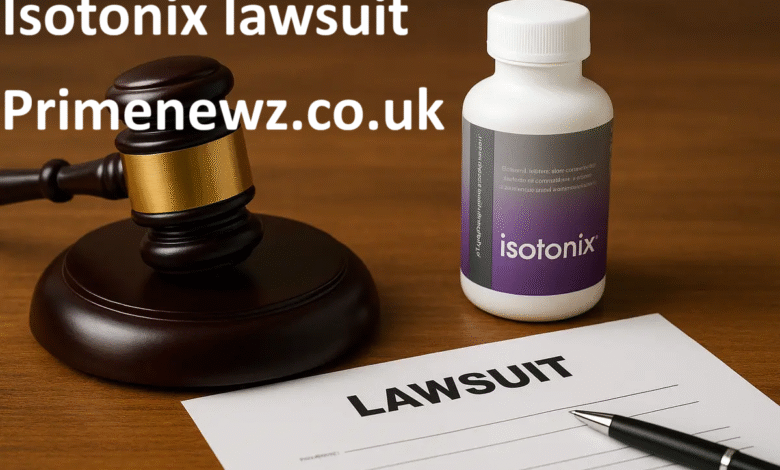Explosive Truth Behind the Isotonix Lawsuit – What Consumers Need to Know Now

If you’ve been taking Isotonix supplements or considering them, there’s a legal storm brewing that you absolutely need to hear about. The Isotonix lawsuit isn’t just another corporate legal squabble—it’s a wake-up call about how health products are marketed, what claims companies can legally make, and whether consumers are getting what they’re actually paying for.
What Exactly Is the Isotonix Lawsuit About?
The Isotonix lawsuit centers on allegations that Market America, the company behind these popular supplements, may have crossed serious legal lines. At its core, consumers and regulatory bodies are questioning whether the company made exaggerated health claims without solid scientific backing. The lawsuit involves multiple serious accusations including false advertising, misleading health benefit statements, and concerns about the company’s multi-level Isotonix Lawsuit marketing structure potentially operating more like a pyramid scheme than a legitimate business.
What makes this case particularly explosive is that it’s not just unhappy customers complaining—federal regulators have stepped in. The FDA issued an official warning letter to Market America in February 2020, citing violations that included failing to report serious adverse health events and making drug-like claims about their supplements without proper approval.
The Science Behind Isotonix Claims Under Fire
Market America has long promoted Isotonix’s “isotonic delivery system” as revolutionary, claiming nutrients are absorbed up to 95% faster than traditional pills. Sounds impressive, right? Here’s the problem: the lawsuit alleges these absorption superiority claims lack peer-reviewed clinical evidence to back them up. Legal documents reveal that while the isotonic concept sounds scientifically advanced, critics argue there isn’t robust research Isotonix Lawsuit proving these supplements work better than regular vitamins.
The legal proceedings specifically examine whether the company conducted adequate research before making bold marketing statements. For consumers who’ve been paying premium prices based on these absorption promises, this revelation feels like a betrayal of trust.
Real People Reporting Real Problems
This isn’t just about marketing jargon—actual consumers have reported experiencing serious side effects. According to FDA documentation, complaints include hospitalizations with symptoms ranging from liver damage and cardiovascular issues to severe gastrointestinal distress. One particularly concerning complaint involved a consumer who Isotonix Lawsuit required inpatient hospitalization after just one week of using Isotonix products, experiencing abdominal pain, vomiting, dizziness, weakness, and numerous other adverse reactions.
As of mid-2025, over 400 consumers have reportedly joined the class action lawsuit after experiencing similar injuries or feeling misled by the product claims. These aren’t minor inconveniences—we’re talking about elevated liver enzymes, irregular heartbeat, persistent migraines, and other conditions that medical experts suggest may stem from mega-dosing certain antioxidants and vitamins at levels exceeding thousands of percent of daily Isotonix Lawsuit recommended values.
The Multi-Level Marketing Controversy

Beyond the product safety concerns, the Isotonix lawsuit shines a harsh spotlight on Market America’s MLM business model. Consumer protection advocates and former distributors allege the company prioritized recruiting new distributors over actually selling quality products. The structure reportedly incentivizes making exaggerated claims to boost recruitment, with top-tier earners profiting primarily from new member sign-ups rather than retail sales.
Watchdog organizations like Truth in Advertising have filed complaints showing distributors made promises about “financial freedom” and “early retirement” without statistical evidence to support these claims. Some distributors Isotonix Lawsuit reportedly invested anywhere from $500 to several thousand dollars in inventory and business materials, with many struggling to recoup their costs.
What This Means for Current and Potential Users
If you’re currently using Isotonix products or thinking about starting, here’s what you need to consider. First, check if you still have your product bottles, receipts, and any medical records related to side effects—this documentation could be crucial if you decide to participate in the class action lawsuit. The legal proceedings have established that consumers who purchased products within four years of injury may qualify for compensation.
Second, approach all supplement marketing claims with healthy skepticism. The Isotonix case demonstrates that even professional-looking products with scientific-sounding delivery systems can make unsubstantiated claims. Isotonix Lawsuit Before purchasing any supplement, verify whether claims are backed by independent, peer-reviewed research rather than company-funded studies.
Where the Lawsuit Stands Right Now
As of late 2025, the case remains active in federal court and is currently in the pre-trial phase with both sides exchanging evidence. A significant development occurred when a judge allowed false advertising claims to proceed, ruling that phrases like “clinically proven” could indeed mislead reasonable consumers. Legal analysts predict possible settlement talks may occur, though Market America continues to deny wrongdoing.
The expanded plaintiff group and mounting regulatory scrutiny suggest this case is far from over. Internal company emails regarding safety complaints have reportedly become central to the legal proceedings, potentially revealing what Market America knew about product risks and when they knew it.
Broader Implications for the Supplement Industry
This lawsuit extends well beyond just one brand. It’s forcing the entire $50 billion dietary supplement industry to confront uncomfortable truths about marketing practices and regulatory oversight. Currently, one in four supplement products make health claims with limited FDA oversight compared to pharmaceuticals. A 2022 survey revealed that 72% of consumers trust supplement labels, despite the industry’s relatively lax regulation.
Other supplement companies, particularly those using MLM models, have started reviewing their marketing materials more carefully. The case has prompted increased transparency about income potential and business costs across the industry, representing what many consider a positive shift toward more honest marketing practices and better consumer protection measures.
Protecting Yourself Going Forward
Whether or not you’ve used Isotonix, this lawsuit offers valuable lessons about navigating the supplement market. Always research MLM brands using resources like Truth in Advertising to track deceptive marketing cases. Check the FDA’s warning letter database before purchasing supplements from any company. If you experience adverse effects, report them through the FDA’s MedWatch portal to create an official record.
Most importantly, consult healthcare professionals before starting any supplement regimen, especially products making extraordinary health claims. Your doctor or pharmacist can help you evaluate whether claimed benefits are scientifically plausible and whether the product might interact with medications or existing health conditions.
The Isotonix lawsuit serves as a powerful reminder that in the health and wellness industry, transparency isn’t just good ethics—it’s essential for consumer safety. As this case continues to unfold, it may well reshape how supplements are marketed, sold, and regulated for years to come.



